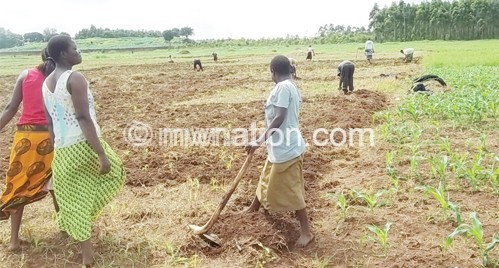chaos awaits jb’s land deal

President Joyce Banda’s move to order distribution of Nantipwiri Estate—the subject of a court battle—could create chaos in Thyolo and Blantyre rural where beneficiaries sound reluctant to respect a ‘pass-on’ deal.
Nation on Sunday has established that authorities have already allocated the land—which Press Agriculture and Deloitte & Touché (Malawi) on one hand and Ralph Tseka on the other are fighting over in court.
Around 200 families from Group Village Head (GVH)Chide in Traditional Authority (T/A) Bvumbwe in Thyolo and William Village in T/A Kapeni, Blantyre, have benefitted from the distribution under the armpits of Banda’s Presidential Initiative on Poverty and Hunger Reduction (PIoPHR).
While technical people say the land is being used as a demonstration centre for best farming practices as part of the presidential initiative, but the beneficiary farmers say no one is teaching them anything and that the land is theirs from President Banda.
Thyolo district commissioner (DC) Bennet Nkasala said in an interview on Wednesday that each family received 0.4 hactares, which they will cultivate for two years, then pass it on to other households.
But some of the beneficiaries Nation on Sunday talked to during a visit to the disputed estate on Thursday said as landless people, they cannot be expected to relinquish their portions to others.
GVH Chide—himself a beneficiary and a local contact point for the distribution—said in an interview at the estate that the exercise is disaster-in-waiting.
“This exercise will create problems for us traditional leaders in future as we cannot move out a person who has land and make that person landless again,” he said.
The problem, Chide explained, is that government allocated the land without a clear exit strategy.
“We do not know what we will do with these people at the expiry of their two-year land holding. Land is very scarce here and most of these villagers have no land. If a person is landless and has been given land then it is taken away from that person, it means you have made the person landless again,” he said in the interview conducted in Chichewa.
Mphatso Kambewa is one of the unlucky ones waiting for their turn as they did not make it into the list of the first group of beneficiaries.
He worries that his turn may never come because, he says, the current holders are likely to cling to their lots.
“What we are not sure of is when the time comes for these people to surrender the land to others, will they do it?” said Kambewa, who we found tilling the land as a hired hand (waganyu) for one of the beneficiaries.
He also made a startling claim.
“A lot of the beneficiaries are well-to-do people. These are the people that are hiring us to do ganyu. Most of these people you see on the land are doing ganyu for the owners who are not here,” said Kambewa.
Madalitso Kabichi, a beneficiary, said before President Banda’s directive, he and others rented land from a certain large land-owner and, as payment, they would surrender three bags of maize—an arrangement that may be described as feudalism.
He does not understand why he has to give up his portion after two years.
“The President said she is going to give us the land since we were landless. But officials from the Presidential Initiative told us that we have to give up the land after farming for two years,” he said.
DC Nkasala said the initiative has benefitted 100 people from his district so that they learn modern farming methods for two years and then return to their lands to apply what they have learnt. The other 100 beneficiaries are from Blantyre.
“Government bought that land and then gave it to people of Thyolo and Blantyre,” he said.
National coordinator for the PIoPHR Flora Kaluwire declined to comment on the ownership of the land in an interview on Friday.
“I am just the user of the land. Ministry of Lands would be in a good position to know who owns that land and the arrangements that are there,” she said.
The Ministry of Lands also declined to comment on Friday, saying the matter is in court.
The villagers are expected to complete agreement forms—which we have seen—on which they have to commit to surrendering the land to others after two years’ use.
However, most of the villagers Nation on Sunday interviewed said they have not yet signed the forms.
GVH Chide said the instructions were to identify landless people in his area and allocate the land to them.
He also said none of the beneficiaries has received any special training apart from receiving farm inputs.
“We are having problems to explain to the villagers that they have to leave the land after two years. Suppose this year one does not harvest enough and then even less yields next year, are we still going to ask that person to leave the land? Where will the person go? How is he going to feed his family?” he wondered.
Tseka’s lawyer Maxwell Tembo claims that when Press Agriculture and Deloitte & Touché (Malawi) withdrew the offer from his client, they sold the land to government.
Apparently, this is the land that President Banda directed on November 6 last year that it be distributed to landless people under her poverty and hunger reduction initiative.
At the time of the presidential directive, the land in question was the subject of a legal dispute between its original owners Press Agriculture and their business advisers Deloitte & Touche (Malawi) on the one hand, and an interested buyer, Ralph Tseka, on the other.
The legal tussle remains unresolved.





